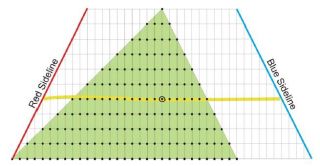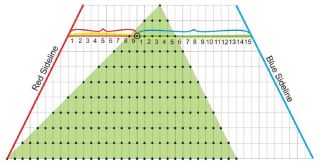Career
On the Past, Present, and Future of Fairness
Tidbits from anthropology, geometric games, and political psychology
Posted July 21, 2012

Contemporary hunter-gatherers probably resemble our ancestors.
The notion of fairness appears to hold innate attraction to the human mind, although exactly what’s fair is undoubtedly culture and situation specific. Surviving hunting-and-gathering groups, whom anthropologists think likely to provide clues to the lifestyles of our ancestors of 10 to 60 thousand years ago, usually live in strikingly egalitarian societies. In such societies, people go to great lengths to avoid jealousy, not only because cooperation is so important for hunting, fishing, and mutual defense, but in part because jealousies so often lead to violence and there’s no central authority to impose law and order.
While modern societies—which can count on such authorities and which have far greater scope for the accumulation of possessions—are considerably more tolerant of inequalities, sensitivity to fairness issues nonetheless lingers on as a mental and emotional inheritance. After all, we remain very much social creatures who measure our success and status with the yardstick of comparison to others.

Trapezoid figure used in Page and Putterman's "uninterpreted trust game" experiment.
Consider again the trust game, discussed in previous postings. A and B, two experimental subjects who will remain anonymous to one another, are each given ten $1 bills by the experimenter. A is asked to decide how many of her dollars (possibly none) to send to B, with both knowing that anything sent will be tripled by the experimenter, then given to B. If A sends something, B then decides whether to return something to A, and if so how much. Returned money is not tripled. The $20 originally evenly divided between A and B can thus become $40 in B’s hands, if A is fully trusting, and this $40 can then be divided in almost any way that B likes (though in the original version, B always keeps at least $10). If B receives money, he can always assure that his counterpart wins at least something for her trust, but he has no selfish, rational reason to do so. A rational selfish A believing herself to be playing with a rational selfish B thus holds onto her money. In experiments, however, most A’s recruited to play the game send some money, and many B’s send money back. Economists who study the nature of social interaction treat this as one more piece of evidence that we’re dealing with the social animal Homo sapiens and not the economics textbook construct, Homo economicus.
But my colleague Toby Page and I wondered whether the reciprocating of trust by B’s, and its apparent anticipation by A’s, might be affected by the cue of “social wording.” In particular, the words “send” and “send back” used in the instructions of the trust game might be suggesting to the subjects that the game is about reciprocity, which sociologists consider “a human universal.” Page devised a version of the game that could be played without ever referring to sending or returning money: he drew a trapezoid with a triangle imbedded in it, and we asked A’s to simply select one of eleven horizontal lines spanning the trapezoid, after which B’s had to select one of the dots located on that line and within or on the boundaries of the triangle. Although all players knew that earnings of A’s would be determined by distance between the point that B selected and the left edge of the trapezoid and that earnings of B’s would be determined by the distance from the selected point to the right edge of the trapezoid, there’s nothing inducing subjects to think of the process as one in which A sends money and B does or doesn’t return some. Without “social obligations,” perhaps selfish rationality would at last prevail in our more neutral version of the game.

Trapezoid figure showing how the dot selected by player B (or Blue) translates into earnings for B and A (Red).
What happened in fact is that somewhat fewer of the A’s chose lines equivalent to sending money when playing the geometric version of the game than when playing the version interpreted with the words “send” and “send back.” This suggests that some A’s (though fewer than half) indeed feared that B’s would react to the geometric task without sense of social obligation, as we’d conjectured. Among B’s who were “sent” money (that is, those B’s whose A counterpart chose a low line in the trapezoid), however, no less a share was “sent back” than in the game with words (i.e., many B’s selected dots near the middle of the trapezoid, not the dots that maximized their own earnings—the ones at the left edge of the triangle). Though perhaps not moved by a sense of obligation to reciprocate, per se, the B’s who chose intermediate dots may nonetheless have recognized that they were in a situation in which they had to determine how money would be shared with another individual. The line they were implicitly dividing by choosing a dot may have recalled countless experiences of sharing a candy bar or a slice of cake or pizza with a friend, and their sense of fairness dictated that they not take everything for themselves.
An interesting aspect of the debate about fairness and the distribution of income is that economists find a correlation between people’s preferences regarding taxation and government expenditure and their beliefs about whether income is determined more by hard work or by luck. Studies find that, at least until the “Great Recession,” more Americans than Europeans endorsed the view that hard work pays off, while more Europeans than Americans responded to the same survey questions with the view that income is determined by luck. The fact that Americans tended to view inequalities of income as fairer than Europeans did was used to explain why governments engage in more redistribution in Europe than in the United States.
Research into income mobility, however, finds that it’s actually becoming harder for Americans on the lower rungs of the socioeconomic ladder to rise substantially than for their counterparts in Europe to do so. This is mainly because the quality of education has greater variance in the U.S., and because whether one gets a good or a mediocre education is more influenced by parental income in the U.S. than in Europe. The question, then, may be whether U.S. perceptions will ever catch up with the U.S. reality of increasing inequality and lower mobility, or will remain forever glued to our Horatio Alger mental models. If beliefs do start to reflect recent realities, then the luck versus effort paradigm predicts that we might return to the more progressive tax regimes of the mid-20th Century, and we may even seek better ways to level the playing field between the children of the poor and those of the rich.


